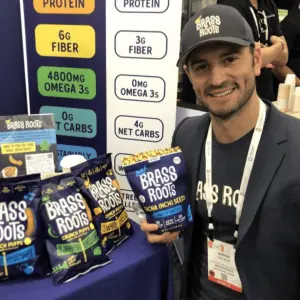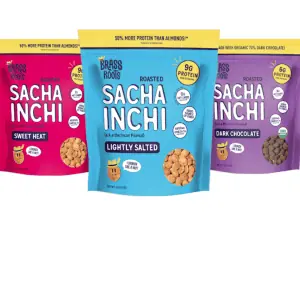Brass Roots makes a line of healthy snack foods from the sacha inchi seed, which is also known as the Incan peanut. The company believes that sacha inchi seeds are a great substitute for peanuts and other tree nuts to which people have allergies. But, will New Orleans-based Brass Roots get a Shark to join their jazzy new healthy snack company? Read our Brass Roots Shark Tank update to find out more about this seedy venture.
What is Brass Roots?
Brass Roots is a company which manufactures a line of snack foods made from the sacha inchi seed. The company is located in New Orleans, Louisiana.
Brass Roots seeks to provide healthy and delicious snacks made with the ancient superfood, the sacha inchi seed, which is also called the Incan Peanut. Their entire range of keto, paleo, and school-friendly products use organic sacha inchi seeds as a nutritious and allergen-friendly source of protein, healthy fats, and fiber to keep you satisfied and energized.
Who created Brass Roots?

Brass Roots was founded in New Orleans, Louisiana by Aaron Gailmor. Aaron attended college at Boston College, where he graduated with a BA degree in Business Administration and Management.
After college, Aaron went to work for Citigroup, and he worked there for over 15 years as a Financial Analyst for Global Capital Markets. Prior to founding Brass Roots, Aaron founded Super Eats, a company which launched the first line of kale chips; however, Aaron discontinued the kale-chip line when he transitioned to Brass Roots and the sacha inchi seed products.
How did Brass Roots get started?
Aaron Gailmor, founder and CEO of Brass Roots launched the company in 2019. He was inspired by his father’s heart condition, as well as other health issues that run in his family, such as Diabetes. Aaron’s goal was to create snacks that were nutritionally dense while still being delicious.
After moving to New Orleans, Aaron was energized by the optimism, perseverance, and community of the city, and Brass Roots was born there. During his Shark Tank taping, Aaron told the Sharks that he had learned a great deal from Super Eats, his first unsuccessful foray into the healthy snack food industry.
Aaron first discovered the sachi inchi seed in a grocery store in California, and he took some back to New Orleans to see if he could blend them into a nut butter. Aaron told Biz New Orleans, “I remember putting them in a food processor, and for the first minute, nothing really happened. And then over the next two to three minutes the seeds eventually turned into this beautiful, golden brown, amazingly tasty sacha inchi butter that smelled very similar to peanut butter.”
Aaron was fascinated by the seeds which had produced this nut butter. He thought, “What can’t I do with this? I could make snack bars with it; I could make just about anything, right?” And that’s when he realized there might be a platform to make a snack brand all around the sacha inchi seed.
Aaron also says that a big part of the Brass Roots brand is its company mission. On the Brass Roots website, Aaron states that the company’s supply chain partnerships and community work support their mission to empower their supplier farmers, and their home city of New Orleans.
Aaron states that the goal of Brass Roots is to give back, and this begins with fair trade wages provided to farmers in South America and Southeast Asia. In Peru, specifically, farmers are also trained on sustainable agriculture practices whereby they avoid slash and burn and monoculture methods. Closer to home, the company also uses its resources to provide snacks and nutrition and entrepreneurship education to kids in New Orleans.
What happened to Brass Roots before Shark Tank?
Brass Roots founder Aaron Gailmor’s fascination with the sacha inchi nut eventually took him to Thailand, where most sacha inchi seeds are now grown commercially. He forged a relationship with a supplier there who uses the proceeds of his business to run a rural K-12 school.
After returning from his sacha inchi scouting trips and sharing some homemade sacha inchi products with friends, Aaron next ran some Facebook ads where he targeted people with peanut allergies. He offered a free packet of sacha inchi snacks, and he also gave recipients a promo code. Then, he tracked conversions to purchases after the samples had been sent, and the conversion rate was really high. Aaron says that about 30% of people who had received samples bought the product, so he knew that he had a winning concept.
The company officially launched at the end of 2019, and they began making the butters and seeds in a New Orleans facility, and they were also making puffs, a healthy version of Cheetos, at a contract manufacturer in Columbus, Ohio.
How did Brass Roots develop before Shark Tank?
Prior to Shark Tank, the company had completed two rounds of investment, the first from a small venture capital firm in Chicago, and a second round in January 2021 from John B. Sanfilippo & Son Inc., a publicly-traded processor, packager, marketer, and distributor of nut and dried fruit-based products that’s known for Fisher and other brands.
Because of the Covid pandemic, Brass Roots focused on e-commerce for their first year, as it was difficult to schedule appointments with retailers, but by late 2021, Brass Roots products were available in Sprouts Farmers Market locations throughout the US, as well as Wegmans Food Markets in the northeast, and Whole Foods in the New Orleans market.
During his time in the Tank, Aaron told the Sharks that the company had revenues of $35k in 2019, $250k in 2020, $500k in 2021, and they were on track to have sales of $1.5 million for 2022.
What do customers think of Brass Roots?
Brass Roots sells the sacha inchi seed-based products on both the company website and on Amazon. On Amazon, we discovered that the company offers two varieties of products, roasted sacha inchi seeds and sacha inchi butters.
Because the Roasted, Lightly Salted Sacha Inchi Nuts had the most reviews, we decided to take a close look at what Amazon customers thought of this product. Amazon reviewers rate the roasted seeds at 3.5 out of 5 stars, with 56% of reviewers giving them a 4 or 5-star rating, and 31% of Amazon purchasers rating the product at only 1 or 2 stars.
What are customers saying about Brass Roots?

On the positive side, most reviewers cite the texture, nutritional value, and quality of the roasted sacha inchi seeds as things that they like; however, critical reviewers tend to complain about the dryness of the seeds, or the value for money.
One satisfied, verified purchaser on Amazon wrote, “I saw these on Shark Tank and immediately bought them. I’ve been Keto for years and having a lower carb option that tastes great, has crunch, and filling is just awesome! I will be buying every other flavor and the ‘peanut butter!’ Can’t wait to try them all. This will be a staple in my house now. The after taste could be strong to some, but I absolutely love it to be able to have the low carb crunchy snack.”
Another very happy Amazon customer declared, “Bought this on a whim after watching Shark Tank. It’s fantastic! I love the taste and they are a great snack. I feel like I’m getting way more nutrients than other snacks. Will definitely be a return customer!”
With 31% of Amazon reviewers giving the Brass Roots sacha inchi products only 1 or 2 stars, we expected to see a number of negative reviews, and we did find quite a few.
One very unhappy Amazon customer said, “I saw these on Shark Tank and I thought, ‘wow, this is a great alternative to nuts because of the lower content of carbs.’ I also like the fact that it was mostly fiber. When I first got the package, I wanted to dive right in and try these delicious honey mustard treats. Unfortunately, the smell of them was sickening. I felt that since I bought them I should at least try them, maybe they taste better than they smell. They were terrible. I didn’t like the taste, and I didn’t like the texture, and I didn’t like the grittiness they left in my mouth, so unfortunately, I will never buy these again. Amazon won’t even let me return them. But that’s okay. Maybe I can find someone who actually likes these horrible things.”
Another dissatisfied Amazon purchaser wrote, “I get they’re trying to replace the peanut/pistachio etc. But regardless of the seasoning, these are incredibly bland, and I couldn’t eat them.”
After reading a large number of reviews, it appeared to us that the sachi inchi seed may well be an acquired taste, and that people seem to either really like them, or not care for them at all.
When did Brass Roots appear on Shark Tank?
Brass Roots appeared on Shark Tank in Season 14, Episode 12, which aired on January 20th, 2023. Brass Roots pitched to regular Sharks Mark Cuban, Lori Greiner, Daymond John, Kevin O’Leary, and returning Guest Shark Daniel Lubetzky, founder of healthy snack food giant KIND.
Along with Brass Roots, there were a number of interesting pitches for healthy food items in Season 14, including JicaFoods.
What happened to Brass Roots on Shark Tank?
Brass Roots founder Aaron Gailmor entered the Tank and asked the Sharks for an investment of $400k for a 7% equity stake in his company.
Aaron marched into the Tank accompanied by a brass duo playing When The Saints Go Marching In, and he then started his pitch by telling the Sharks that the prevalence of peanut allergies had tripled in recent years, and thousands of schools had banned peanuts and tree nuts of any kind in schools. He said that even the PBJ sandwich, a favorite among many children, has been banned from schools.
He then tied in the musical accompaniment when he said, “So the Big Easy is making snacking a whole lot easier with Brass Roots, the first snack made from the sacha inchi seed.” He explained that the sacha inchi seed was also referred to the Incan peanut because “it looks, tastes, and crunches like a nut but without the allergens, so it is school and airline pantry safe, and compared to an almond, highly considered one of the healthiest nuts, it’s got 50% more protein, and it’s high in Omega 3 fats.”
Aaron let the Sharks know that the sacha inchi seed also had zero net carbs, so it’s Keto and Paleo friendly. Brass Roots products, Aaron finally told the Sharks, include roasted sacha inchi seeds, and sacha inchi seed butter. He then invited the Sharks to join the band and snack with a purpose.
Next, the Sharks sampled various flavors of the sacha inchi seeds, as well as a PBJ made with sacha inchi butter. After tasting his samples, Guest Shark Daniel Lubetzky said, “Boy is that delicious!” Lori Greiner added that she loved the truffle one. And then Lori asked Aaron to tell the Sharks about himself.
Aaron told Lori that after his father was diagnosed with heart disease about 8 years ago, he became very interested in nutrition, and it became sort of an obsessive hobby for him. Aaron also said that when he moved to New Orleans, he had discovered a high prevalence of both childhood diabetes and adults suffering from cardiovascular and other health problems, so when he decided to build a company, he wanted to align it to work with community groups, especially those teaching children about nutrition.
When Lori followed up asking what he was doing before this business, he told her that he had worked for CitiGroup in investment banking, and he had founded a prior healthy snack business, Super Eats, a company which produced the first kale-based chip product. However, Aaron revealed that Super Eats had failed but that he had learned a lot from the experience of trying to grow that business too fast.
Aaron also revealed that he had given equity in his new business to investors who had helped him with the failed enterprise. Kevin O’Leary seemed interested, but concerned, after hearing about the previous failure, and he wanted to know why Chef Wonderful should write a check for $400k to get involved in this.
Aaron answered Kevin by telling the Sharks that they launched late in 2019 and had $35k revenues for the first year; in 2020, they had $250k in revenues, $500k in 2021, and they were projecting 2022 sales of $1.5 million. O’Leary also learned that the company had only $100k in the bank and that the company was burning between $20k-$30k per month.
When O’Leary heard this, he told Aaron, “So you’re in a tough place here, you’re gonna burn out in 90 days.” Daniel then asked about the retail price and the cost to make the sacha inchi seed products, and Aaron informed him that they sell the roasted seeds and the seed butters for $17.99, and that they cost between $4.50-5.00 to make.
Daymond John thought that the prices sounded high, but Aaron responded that they were actually at a discount to organic almonds. Daniel then followed up and inquired if the company had raised any money, and Aaron let him know that they had raised $1.7 million and that the last valuation was at $5 million.
Mr. Wonderful seemed interested, but he said that with investors in at a $5 million valuation and only 90 days of cash in the bank, there was no way that he would invest at a $5.7 million valuation. He then asked Aaron, “How much pain are you willing to take?”
This comment prompted Daymond to ask Aaron how much equity he still owned in the company, and Aaron replied that he retained 33%. And Aaron explained that he had only 33% because he was still carrying investors from the previous company, which folded. O’Leary said that this was honorable, but “in venture investing, sometimes poo-poo happens, and you lose money.” Mark Cuban then said to Aaron, “But your friends are friends forever, right?”
At this point, the Sharks appeared ready to announce their intentions.
Did Brass Roots get a deal on Shark Tank?
Brass Roots did not get a deal in the Tank. Several of the Sharks were impressed with both the founder, Aaron, and his product, and the real good that he was trying to do in his community; however, they could not get past some of the business decisions which had been made.
After hearing about Aaron carrying previous investors into the new venture, Kevin O’Leary said that this “would burden me with all of the past sins, so I’m out.” Mark Cuban next said that Aaron was in a real catch-22 because he needed to spend money to educate people about what sacha inchi seeds are, and along with this, the company’s margins were small, so he thought this would be difficult, and he followed Mr Wonderful to the exit.
Daymond told Aaron that he was an “amazing beautiful person who was trying to solve a lot of things, but at the same time, you only have 33% left, so there’s no meat on the bone left for me to be comfortable.” Lori spoke up and told Aaron that he had an interesting product, but there was a lot of consumer education to do here, and she did not know enough about the product to help him.
Finally, Daniel said that he was struggling with the deal because there was a lot of good in what Aaron was doing, but the company was just not investable for him at the moment.
Brass Roots Shark Tank update, what happened after Shark Tank?
While Brass Roots did not manage to get a deal on Shark Tank, it appears that founder Aaron Gailmor took to heart both some of the criticism and advice which the Sharks shared with him on the show. Brass Roots raised prices on their products to improve margins, and they also reduced expenses, including reducing the number of staff.
In addition, the company changed their packaging to make it more appealing while providing clear information about the benefits of sacha inchi seeds, and they phased out some products which were not selling very well. All of these changes finally brought Brass Roots into profitability by the first quarter of 2023.
After the taping of the Brass Roots Shark Tank episode, it appears that KIND Snack Food founder Daniel Lubetzky had continued to follow Aaron’s journey with the company, as on the night the episode aired, Lubetzky tweeted, “Aaron shows signs of a great entrepreneur by using the lessons he learned from his first business to inform how he’s building.”
Finally, Brass Roots has also continued developing new products, as they have released a Dark Chocolate Coated Roasted Sacha Inchi seed product, and they are working on a Sacha Inchi Bar, a nutritious protein bar made from sacha inchi seeds, with a high fiber content and Omega-3. Along with the new products, Brass Roots has garnered additional positive press after Shark Tank, including being listed on Whole Food Magazine’s list of 25 Trends to Watch For.

